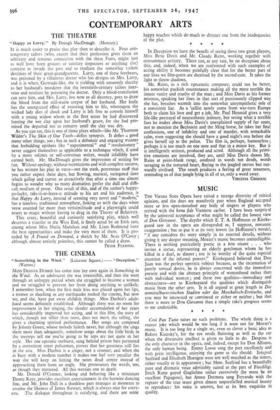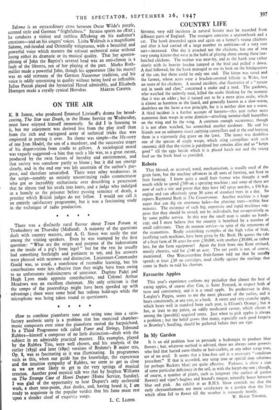MUSIC
THE Vienna State Opera have raised a strange diversity of critical opinion, and the days are manifestly past when England accepted more or less open-mouthed any body of singers or players who arrived with the bona fide Viennese cachet. I have been surprised by the universal acceptance of what might be called the lowest view of Don Giovanni. The depths which E. T. A. Hoffmann or Kierke- gaard saw in the opera are disregarded as, I suppose, romantic exaggeration ; but to put it at its very lowest (in Hoffmann's words), " if one considers the story simply in its external details, without giving it any deeper meaning, Mozart's music becomes unintelligible. There is nothing particularly poetic in a bon vivant . . . who invites a statue, representing an elderly gentleman whom he has killed in a duel, to dinner ; nor is he worthy of the quite especial attention of the infernal powers." Kierkegaard believed that Don Juan was the perfect operatic subject because, as the incarnation of purely sensual desire, he is always concerned with the immediate present and with the abstract principle of womanhood rather than with individual women ; and these two qualities—immediacy and abstractness—are to Kierkegaard the qualities which distinguish music from the other arts. It is all argued at great length in Die unmittelbarerotischen Stadien oder dos Musikalisch-Erotische, and you may be interested or convinced or either or neither ; but that there is more to Don Giovanni than a simple rake's progress seems to me undeniable.
* * * * Cosi Fan Tune raises no such problems. The whole thing is a rococo joke which would be too long if it were not for Mozart's music. It is too long for a single set, even so clever a basic idea as Robert Kautsky's, for the eye needs flattering as well as the ear when the discursive intellect is given so little to do. Despina is the only character in the opera, and, indeed, except for Don Alfonso, the only human being. Emmy Loose sang the part excellently and with great intelligence, enjoying the game as she should. Irmgard Seefried and Elisabeth Hoengen were not well matched as the sisters, either vocally or in appearance ; but Mme. Seefried has a beautifully pure and dramatic voice admirably suited to the part of Fiordiligi. Erich Kunz guyed Guglielmo rather excessively (he must be an excellent Papageno), but Anton Dermota sang Ferrando with the rapture of the true tenor given almost unparallelled musical beauty to reproduce: his voice is uneven, but at its best exquisite in quality. Salome is an extraordinary cross between Oscar Wilde's purple, scented style and German "frightfulness" Strauss spares no effect ; he conducts a violent and ruthless Bi!tzkrieg on his audience's emotions—and on his singers' voices. Ljuba Welitsch is a magnificent Salome, red-headed and Orientally voluptuous, with a beautiful and powerful voice which masters the colossal orchestral noise without losing either its dramatic or its musical quality. That her apostro- phising of John the Baptist's severed head was an anti-climax is a fault of the libretto, not of her playing of the part. Marko Roth- miiller made a powerful John, though his appearance (like his music) was an odd remnant of the German Nazarene,- tradition, and his voice is oddly unresisting in quality without being hard or inflexible. Julius Patzak played the hysterical Herod admirably, and Elisabeth



































 Previous page
Previous page